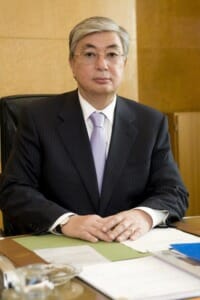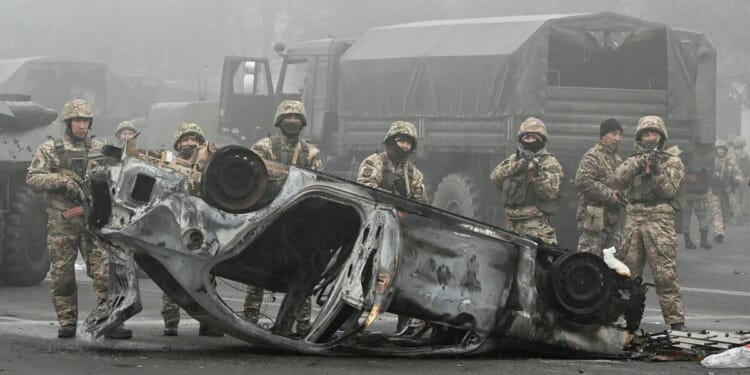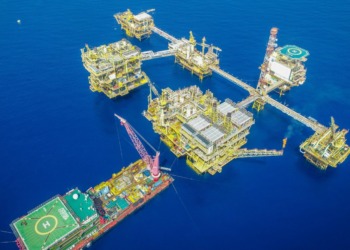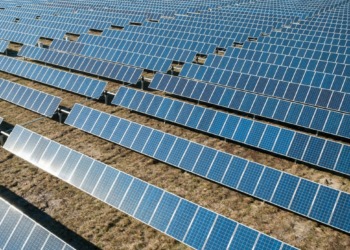Protests began in response to the rising fuel prices, Kazakhstan is one of the largest oil, gas and coal producers in the world. Over just two days violence had reached “absolutely unprecedented” levels according to Maximilian Hess, a Russian and Central Asian expert and fellow at the Foreign Policy Research Institute. Even the presidential palace was set on fire:
The Presidential Palace in #Kazakhstan has been destroyed by protestors. Take a look.pic.twitter.com/9nJy8MHCSu
— Steve Hanke (@steve_hanke) January 8, 2022
But since the first protest began, the nature of the movement has changed. Protests have now escalated into a full blown anti government movement. They now express discontent in this former Soviet nation over corruption, living standards, poverty and unemployment.
Kazakhstan’s current autocratic President Kassym-Jomart Tokayev’s alliance with Russia became evident when Russia sent in troops to help him gain back control. Tokayev has taken a strongman stance that recalls Soviet times. It is reported that he has told troops they could “fire without warning” and when he addressed the nation he said of the protestors “They need to be destroyed and this will be done.”
It would appear Tokayev meant what he said and so far 26 protestors have been reportedly killed; the interior ministry described them as “armed criminals” and “terrorists” and they were being “liquidated”; and hundreds have been wounded. A massive 3,800 arrests have been made.

On Friday it was announced that order had been “mainly restored” but Kazakhstan had not witnessed unrest like this since it gained independence in 1991. The extent and violence of protests were unprecedented. They set fire to the presidential palace and the City Hall in Almaty; they took over the airport; they set fire to police vehicles and to the regional branch of the ruling Nur Otan party. The police have accused demonstrators of causing the deaths of 13 officers and leaving 748 injured.
This particular information is being communicated by the Kazakhstani state television show Kabar 24, so it may not be entirely accurate. As the country is under autocratic rule there is little to no independent journalism within the country. In addition, during the protests the authorities suspended the internet, quelling much of the citizens’ ability to communicate and express their experience during the riots.
When protesters pulled down the statue of the country’s founding President Nursultan Nazarbayev, the full extent of the corruption in the country’s political system came on display. In response to the protests, Tokayev, who had been selected in 2019 by Nazarbayev as his successor, removed Nazarbayev from the position he had maintained as head of the country’s powerful Security Council. At the same time, he sacked the Prime Minister and the entire Kazakhstan cabinet, replacing them with people he could trust.
In short, there was an internal power struggle between the former and present presidents of the country, and whether the struggle is resolved is still not clear. Nazarbayev’s press secretary is reported to have said today that the ex-leader is in the capital Nur-Sultan, dismissing rumors of him leaving Kazakhstan in the wake of the unrest; moreover, according to the spokesman, Nazarbayev is apparently urging support for the government.
Related Articles: Authoritarian Governments Abusing Interpol to Pursue Opponents Abroad | Nato warns Russia against provoking Ukraine
But however these moves eventually work out, they have not put a stop to the protests. Protestors are seeking massive changes including an election system for regional leaders.
To understand why the situation in Kazakhstan may have global implications on the world’s geo-political system, it helps to take a step back. Up until now Kazakhstan had known little opposition. The country had been run smoothly following the classic autocratic model of former Soviet reòpublics in Central Asia and it was marked by political and economic stability. Kazakhstan was always the poster child in Russia’s backyard. But now this unrest has unsettled Russia and eventually could have repercussions on Russia’s relationship with the United States.
For Russia’s President Putin Kazakhstan was always a mirror of sorts for Russia when it comes to economic and political systems; it was unquestionably part of Russia’s sphere of influence. The report that Putin immediately sent 2,500 troops to assist the Kazakhstani forces comes as no surprise. This intervention known as the Collective Security Treaty Organisation, a Russian version of NATO, is the first time that its protection clause has been invoked.
The turmoil in Kazakhstan has exposed the vulnerability of the strongman leader structure which has predominated in Central Asia for many years. Some observers argue that it has presented Russia with another opportunity to reassert its influence in what used to be Soviet territory. Whether this is an opportunity and a win or a major problem for Putin is still not clear. Some see it as a strategic win:
One thing is certain, this is not the first time it happens. It is in fact the third uprising against an authoritarian, Kremlin-aligned nation: Protests previously occurred in the Ukraine in 2014 and in Belarus in 2020.
The chaos threatens to undermine Moscow’s power in the region at a time when Russia is trying to assert its economic and geopolitical power in countries such as Ukraine and Belarus.
The United States also has cause to be concerned about the unrest in Kazakhstan as it has become a significant country for American energy concerns. Exxon Mobil and Chevron have invested billions of dollars in western Kazakhstan, the region where the unrest began this month.
The possible global impact of this unrest is clear but also it would now appear that as a nation the Kazakhstani people are finding their voice. For many years under a harsh authoritarian regime free speech was discouraged; in fact public protests are actually illegal, so to risk so much to voice their dissent could signal an end to the oppressive system in place.
The people of Kazakhstan are looking for their freedom and as President Tokayev has only been in government for three years is the nation turning against him? Is he a man losing his grip on power he did not earn but rather was granted? Will this be the last of the unrest we see in Kazakhstan? It is the first time in 31 years it has seen such violence. Perhaps it will be another 31 years before it happens again; hopefully that will be unlikely.
Editor’s Note: The opinions expressed here by Impakter.com columnists and contributors are their own, not those of Impakter.com. — In the Featured Photo: Protests in Kazakhstan, Jan 6, 2022 Featured Photo Credit: ANirban Banerjee










